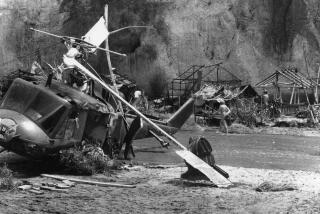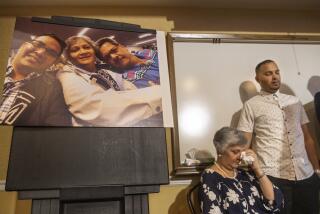Judge Relents, Declares Mistrial in Lawsuit Over Cerritos Air Crash
- Share via
A federal judge Monday reversed himself and declared a mistrial in the civil case over responsibility for the 1986 Cerritos air disaster that killed 82 people, saying it would be “much cleaner” to start over with a new jury.
U.S. District Judge David V. Kenyon’s decision resolved a legal wrangle over whether the original jury had been tainted by evidence that should have been excluded from the trial.
Jurors had been told that William K. Kramer, 53, the pilot of the small plane that slammed into an Aeromexico DC-9, could have suffered a heart attack just moments before impact. Attorney Franklin Brummett, who is representing Kramer’s surviving children, raised the scenario in his opening statement to refute claims by U.S. government attorneys and Aeromexico that Kramer was negligent and responsible for the disaster.
Kenyon said it would have been unfair to continue the trial. “I see some prejudice--some very real genuine prejudice--to certain parties,” he said, “Let’s get a new jury panel down.”
A new trial could begin by next week.
Last Thursday, the judge rejected a motion for a mistrial by government attorneys, who were angry about the heart attack scenario, calling it an emotional argument that was not based on evidence.
Justice Department attorney Steven J. Riegel had contended that such an argument was not included in pretrial papers and had “irrevocably tainted” the jury. In refusing the mistrial request, the judge did restrict how the argument could be introduced that Kramer may have been disabled moments before his Piper Archer plane hit the jetliner on Aug. 31, 1986.
But before opening statements resumed Monday, Riegel asked Kenyon to reconsider whether the jury was tainted.
“Going on with this jury is over our very strong objections,” Riegel said.
That prompted further wrangling among attorneys for the victims’ survivors, Aeromexico and the survivors of the jetliner’s crew. Lawyers for Kramer’s four surviving children were silent.
At one point Monday, Kenyon offered to conduct a “mini-trial”--before any further opening statements or witnesses--on whether Kramer suffered a heart attack or was disabled during the fatal flight when his plane went into airspace restricted to jetliners and collided with the Aeromexico DC-9.
If the jury decided Kramer was not negligent because he was incapacitated, his estate would be dismissed as a defendant and the jury’s role would be done. The judge then would have heard the rest of the evidence.
Kenyon’s suggestion--rarely done in most court trials--caught the battery of attorneys off-guard as they maneuvered for favorable legal ground. For example, lawyers representing the bulk of the victims’ families said they wanted the mini-trial. They wanted to present evidence from the Federal Aviation Administration’s final accident report on Kramer’s heart condition, even though they contend that Kramer was partly responsible for the accident.
Kramer’s $1-million life insurance policy and $20,000-estate are not large enough to satisfy the damages sought by the victims’ families. Thus, their attorneys also blame the FAA and Aeromexico and are seeking damages from them. The case before Kenyon is the consolidation of more than 50 lawsuits filed as a result of the in-flight collision.
Although Riegel and Aeromexico attorney Frank Silane said they could easily defeat the heart attack claim, they would not accept the judge’s offer of a mini-trial.
It was then that Kenyon declared the mistrial, saying he did not want to be “dragging certain parties along kicking and screaming.”
The jurors, who only heard about 1 1/2 days of opening arguments and had heard no testimony since Nov. 2, sat quietly when Kenyon informed them of the mistrial. Later, several of the jurors were divided over whether the supposed heart attack argument had influenced them.
“It really made no difference to me,” said an Orange County housewife, who asked that her name not be used. “I was going to hear all sides like the judge asked us to.”
But another juror, carpenter Peter Stein, 36, of Glendora, said the argument was something new and that it probably had “tainted” him as government attorneys had contended.
More to Read
Sign up for Essential California
The most important California stories and recommendations in your inbox every morning.
You may occasionally receive promotional content from the Los Angeles Times.










